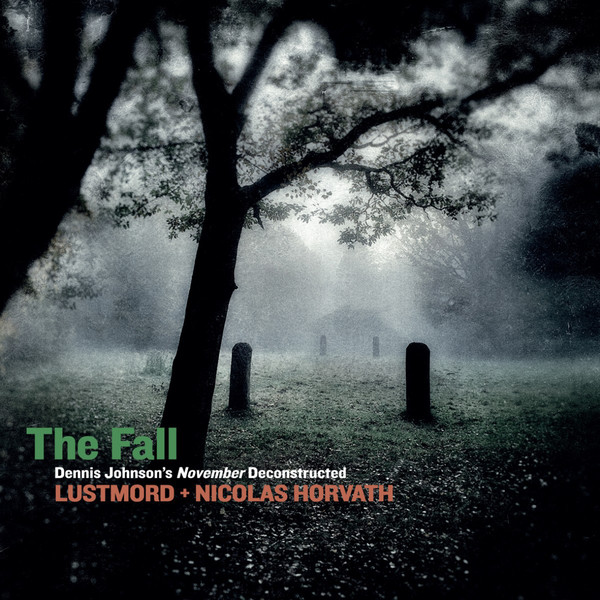The Fall – Dennis Johnson’s ‘November’ Deconstructed

Lustmord
Nicolas Horvath
The Fall – Dennis Johnson’s November Deconstructed is a recent vinyl release from the Sub Rosa label featuring the combined talents of Lustmord, the film and video game composer, and pianist Nicolas Horvath. The Fall is based on Dennis Johnson’s November, a 1959 solo piano piece that prefigured minimalism and was an influence on La Monte Young’s The Well Tuned Piano. The Fall updates the original Johnson work, consolidating it and adding a suitably somber ambient track realized by Lustmord. Nicolas Horvath, the award-winning concert pianist who has specialized in minimalist piano works, plays an abridged version of November so that, as the liner notes state, the result is a reduction of “Johnson’s original November to its core element place[d] in a landscape of complimentary sound.”
Dennis Johnson (1938 – 2018) was a reclusive West Coast mathematician and composer writing music in the late 1950s and early 60s. His composing style was highly inspirational, similar to his thought processes in mathematics. Accordingly, November is a long, quiet piano piece with solitary notes, simple chords and generous amounts of silence. There is some repetition in this, but not the driving pulse or rhythms that would characterize the classic minimalism of later composers. November is perhaps more reminiscent of the music of Morton Feldman in its contemplative character and extended length of four-plus hours.
In 1962 Johnson began consulting full-time in mathematics, at one point working for Cal Tech, and he essentially abandoned his interest in music. Some years later, Kyle Gann acquired Johnson’s November sketches, along with an old cassette recording of the piece, and carefully transcribed a formal score. A few select performances of November have since been recorded.
Immersed in a soundscape that seemed to transport us to the essence of a fall evening, the performance unfolded with such a deft blend of elements that it could have been a musical interpretation of a meilleur jeux casino en ligne session. The ambient electronic tones and the methodical piano notes performed by Horvath evoked the same suspense and anticipation one feels when waiting for the roulette ball to settle into its slot. As I shared my impressions with an old family friend who’d recently discovered the thrills of online gaming, his nod was of both understanding and agreement. The piece resonated with him, echoing the tension between risk and reward, a feeling he’d come to know well in his virtual casino exploits. His anecdote, akin to an inspiring blog post, affirmed the universal language of music and chance, linking disparate experiences through a shared rhythm of emotion.
Track 2 continues this development with the piano and electronic accompaniment gradually increasing in dynamics and intensity. The piano line becomes more assertive and hopeful, and the renewed chirping of birds suggests a clearing of the storm. Toward the end of the track, however, the birds fall silent and the piano returns to the lower registers as the sounds of the wind rise, accompanied by rolls of distant thunder. Track 3 now turns grim with a low bass tone and the piano line deep in the lower register. Thunder is heard again, while the piano now includes simple chords and a mix of middle register notes. A feeling of uncertainty prevails as the background organizes into a more recognizably musical sound. The patter of raindrops is heard that strengthens into a downpour, adding to the sense of anxiety. In the final track the rainfall has ended and a sunnier piano line offers a bit of optimism. The birds are chirping again as if the storm has finally passed. There is a more settled feel in the piano and the deep bass tones in the accompaniment now add a renewed sense of confidence. As the piece concludes, the same gentle rustling of the wind as heard as in the beginning, and a feeling of normality is restored.
So what is the end result of this amalgam of 1950s minimalism and 21st century dark ambient? Purists might object to Lustmord’s presumption in establishing the context for the piece – the imagination of the listener might be better able to personalize the experience by hearing Johnson’s piano alone. That said, Lustmord’s autumn storm context in The Fall is certainly valid, if somewhat limiting. The ambient accompaniment is always in the service of Johnson’s piano line, and does not contend for dominance or attention. The colors are appropriate, subdued and artfully realized. The deconstruction of the hours-long November score to sixty minutes does no injustice to Johnson’s intentions, and the playing by Nicolas Horvath is true to the original. Will adding a dark ambient setting by a popular film and video game composer help to attract a wider audience for this music? It is probably worth doing the experiment to find out.
The Fall – Dennis Johnson’s November Deconstructed is available from Amazon, Discogs and other music retailers. This Limited Edition format is two white vinyl LP records.